

Carbon Footprint of Food Graphic - Climate Impact of Meats vs Vegetables. Obesity & Research. Google Image Result for. Documentary. For most Americans, the ideal meal is fast, cheap, and tasty.
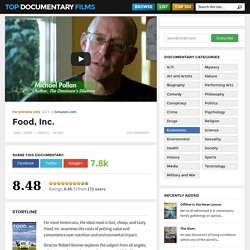
Food, Inc. examines the costs of putting value and convenience over nutrition and environmental impact. Director Robert Kenner explores the subject from all angles, talking to authors, advocates, farmers, and CEOs, like co-producer Eric Schlosser (Fast Food Nation), Michael Pollan (The Omnivore's Dilemma), Gary Hirschberg (Stonyfield Farms), and Barbara Kowalcyk, who's been lobbying for more rigorous standards since E. coli claimed the life of her two-year-old son. Sugar Health Effects: Is Refined Sugar Bad For You?
Can you get addicted to sugar?
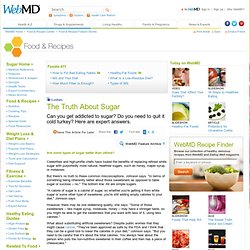
Do you need to quit it cold turkey? Here are expert answers. American Heart Association Recommends Limiting Added Sugars. American Heart Association Issues Guidelines on How Much Added Sugar Is Too Much Why do I need to register or sign in for WebMD to save?
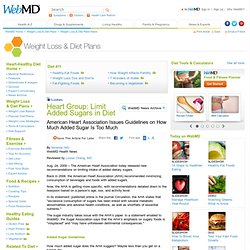
We will provide you with a dropdown of all your saved articles when you are registered and signed in. Aug. 24, 2009 -- The American Heart Association today released new recommendations on limiting intake of added dietary sugars. Back in 2006, the American Heart Association (AHA) recommended minimizing consumption of beverages and foods with added sugars. Now, the AHA is getting more specific, with recommendations detailed down to the teaspoon based on a person's age, sex, and activity level. In its statement, published online in the journal Circulation, the AHA states that "excessive consumption of sugars has been linked with several metabolic abnormalities and adverse health conditions, as well as shortfalls of essential nutrients.
" The sugar industry takes issue with the AHA's paper. Continue reading below... Added Sugar Guidelines. Study: Vegan Diets Healthier For Planet, People Than Meat Diets. The food that people eat is just as important as what kind of cars they drive when it comes to creating the greenhouse-gas emissions that many scientists have linked to global warming, according to a report accepted for publication in the journal Earth Interactions.
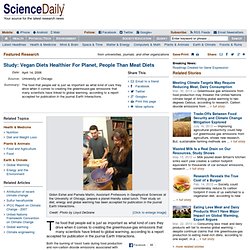
Both the burning of fossil fuels during food production and non-carbon dioxide emissions associated with livestock and animal waste contribute to the problem, the University of Chicago's Gidon Eshel and Pamela Martin wrote in the report. The average American diet requires the production of an extra ton and a half of carbon dioxide-equivalent, in the form of actual carbon dioxide as well as methane and other greenhouse gases compared to a strictly vegetarian diet, according to Eshel and Martin. And with Earth Day approaching on April 22, cutting down on just a few eggs or hamburgers each week is an easy way to reduce greenhouse-gas emissions, they said.
The Science Behind Healthy Vegetarianism and Veganism. Eating red meat raises 'substantially' risk of cancer or heart disease death. Eating any kind of red meat was found to increase the chances of dying from heart disease by 16% and from cancer by 10%.
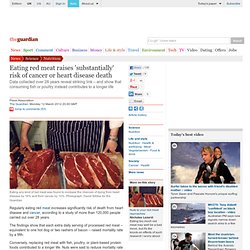
Photograph: David Sillitoe for the Guardian Regularly eating red meat increases significantly risk of death from heart disease and cancer, according to a study of more than 120,000 people carried out over 28 years. The findings show that each extra daily serving of processed red meat – equivalent to one hot dog or two rashers of bacon – raised mortality rate by a fifth. Conversely, replacing red meat with fish, poultry, or plant-based protein foods contributed to a longer life. Nuts were said to reduce mortality rate by 20%, making a case for swapping roast beef for nut roast. Data from 121,342 men and women taking part in two large US health and lifestyle investigations were analysed to produce the findings, published in the journal Archives of Internal Medicine.
Red Meat Can Kill, Say Scientists In US. Red meat is not only unhealthy but can be positively lethal, according to a major US study.
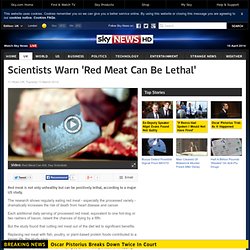
The research shows regularly eating red meat - especially the processed variety - dramatically increases the risk of death from heart disease and cancer. Red meat: What makes it unhealthy? Scientists said Monday that eating red meat was associated with an increased… (Mark Boster / Los Angeles…) On Monday, researchers at the Harvard School of Public Health released study results showing that red meat consumption was associated with a higher risk of early death.
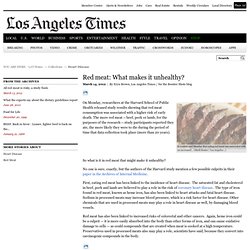
The more red meat -- beef, pork or lamb, for the purposes of the research -- study participants reported they ate, the more likely they were to die during the period of time that data collection took place (more than 20 years). So what is it in red meat that might make it unhealthy? No one is sure, exactly, but the authors of the Harvard study mention a few possible culprits in their paper in the Archives of Internal Medicine.
Meat Consumption and Risk of Colorectal Cancer. All red meat is bad for you, new study says. Any amount and any type -- appears to significantly increase the risk of premature death, according to a long-range study that examined the eating habits and health of more than 110,000 adults for more than 20 years.
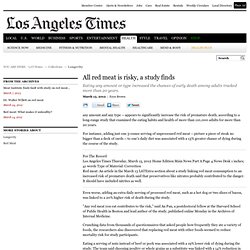
For instance, adding just one 3-ounce serving of unprocessed red meat -- picture a piece of steak no bigger than a deck of cards -- to one's daily diet was associated with a 13% greater chance of dying during the course of the study. For The Record Los Angeles Times Thursday, March 15, 2012 Home Edition Main News Part A Page 4 News Desk 1 inches; 41 words Type of Material: Correction Red meat: An article in the March 13 LATExtra section about a study linking red meat consumption to an increased risk of premature death said that preservatives like nitrates probably contributed to the danger. It should have included nitrites as well.